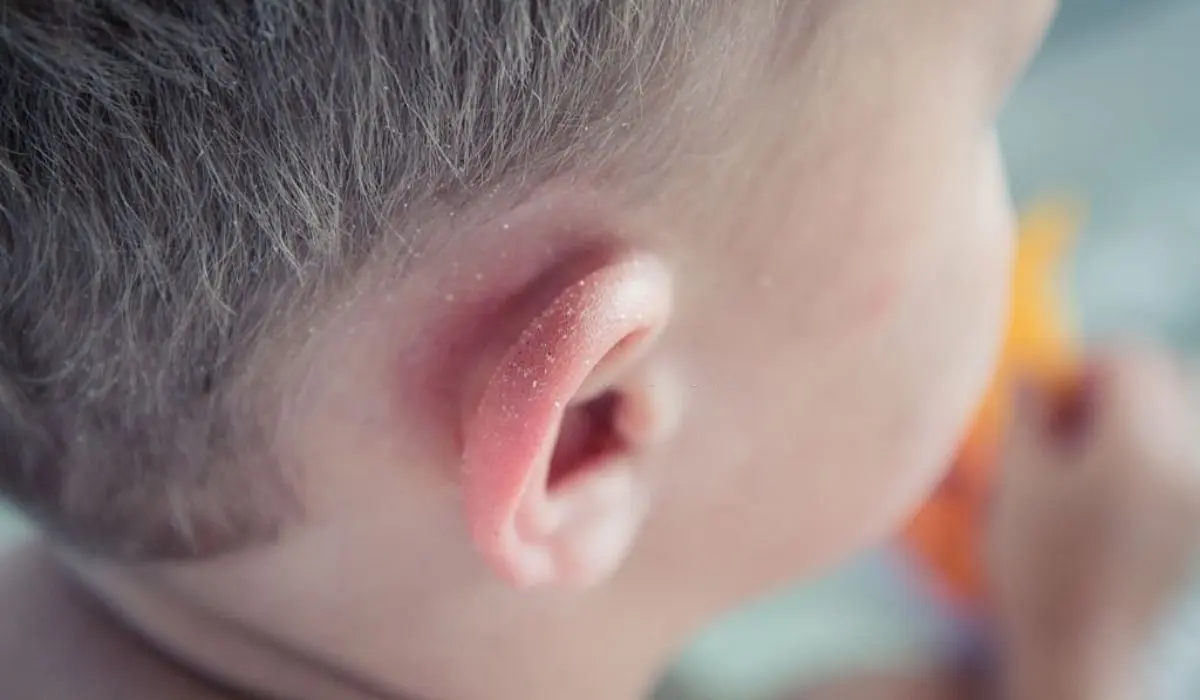Eczema is a common skin condition marked by irritated, inflamed skin that appears red, flaky, and very itchy. Also termed atopic dermatitis, eczema can affect the sensitive skin of the ears, causing discomfort.
Read on to learn effective natural remedies to soothe and treat eczema affecting the ear area.
Natural Ear Eczema Treatments
Eczema, clinically known as atopic dermatitis, most often appears on the face, back of knees, hands, and inside the elbows. But the ears are also prone, especially the earlobes, behind the ears, and along outer ear cartilage.

Eczema occurs when the skin barrier function is impaired, triggering enhanced sensitivity and inflammatory response to irritants. Signs include redness, dryness, flaking, crusting, swelling, erosion, and severe itching of the affected skin.
While eczema cannot be cured, natural treatments aimed at strengthening the skin and reducing inflammation are useful for managing eczema flare-ups affecting the delicate ear area. Always avoid excessive scratching which further damages skin.
While frustrating, natural remedies allow safe, effective relief from eczema flares around the ears. Preventing recurring symptoms improves long-term ear health.
1. Moisturize Diligently
Dryness worsens ear eczema itching, so keeping the area well-hydrated and moisturized is key. Look for thick, rich emollient creams and ointments containing colloidal oatmeal, ceramides, hyaluronic acid, and shea butter. Apply moisture after bathing and reapply frequently.
2. Dietary Considerations
Identify and avoid any dietary triggers that seem to worsen ear eczema like dairy, eggs, nuts, wheat, soy, or seafood. These vary individually. An elimination trial may help pinpoint problematic foods. Anti-inflammatory omega-3s found in fatty fish can help reduce inflammation driving eczema flares.
3. Treat with Aloe Vera
Pure aloe vera gel has soothing, anti-inflammatory properties ideal for eczema. It also accelerates skin healing. Apply chilled aloe vera a few times daily on eczema-affected ears for relief from redness and itching. Or find creams containing aloe vera.
4. Try Calendula
Calendula has natural anti-inflammatory, antimicrobial, and wound-healing abilities. Applying creams and ointments containing calendula extracts helps calm ear eczema irritation and dermatitis. The herb marigold contains high amounts of healing calendula.
5. Use Sea Salt Soak
Soaking the ears in warm water mixed with sea salt pulls out fluid from inflamed tissues and softens crusty areas. This promotes healing. Do this for 5-10 minutes as needed to hydrate, soothe itching, and fight any infections.
6. Optimize Immunity
A weakened immune system and chronic post-nasal drip can increase ear eczema flares. Take key immune-supporting nutrients like zinc, vitamin C, elderberry, and vitamin D. Keep allergies in check. Get the flu shot to prevent secondary ear infections.
7. Minimize Scratching
As hard as it is, scratching only induces more inflammation. Keep nails trimmed short. Use cold compresses if itching flares. Distract yourself with hobbies. Try anti-itch creams containing pramoxine or hydrocortisone as needed. Protect eczema-prone ears with cotton bandages.
8. Wash with Gentle Cleansers
Use only mild, fragrance-free cleansers on sensitive ear skin affected by eczema. Avoid regular soap and scrubbing. Rinse well, then gently pat dry. Shower with lukewarm, not hot, water.
9. Manage Stress
High stress exacerbates eczema, as it stimulates inflammation. Make time for relaxing activities like yoga, meditation, or walks in nature. Getting adequate sleep also helps control eczema flare-ups.
FAQs
No, eczema does not directly affect hearing, unless you get a severe ear infection. Scratching around the ear canal opening could potentially cause some damage.
Yes, ear eczema can emerge at any age. Allergies, irritants, or hormonal shifts can trigger new cases, even in adulthood. See an allergist or dermatologist.
There is no cure for eczema, including ear eczema. With diligent skin care and avoiding triggers, you can manage flare-ups and keep symptoms minimal.
It is best to avoid swimming until the ear eczema resolves, as chlorine can be very irritating. Use earplugs if you do swim.
Yes, eczema often first appears behind the ears and then spreads to the earlobes, neck, cheeks, or scalp. Treating it early can help contain it.
Yes, eczema often first appears behind the ears then spreads to the earlobes, neck, cheeks or scalp. Treating it early can help contain it.
With a gentle natural regimen tailored to your symptoms and triggers, troubling eczema in and around the ears can be managed for better comfort. See your dermatologist for guidance.
Related: Using Hydrogen Peroxide For Ear Wax Removal: What You Need To Know

